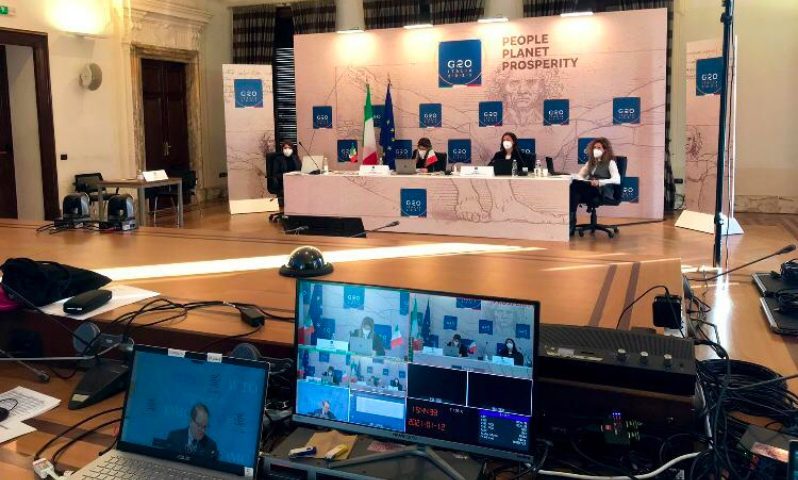G20 2021: economic recovery will be through digital revolution
The topic was discussed today during the first Framework Working Group Meeting held today
January 12th, 2021
2020 shall be remembered as the year of the outbreak of the Covid-19 pandemic. The response to the crisis and the need to adapt our lifestyles to the new social distancing measures were the distinctive features of the past year. A year that ended with the images of the first doses of vaccine given to medical staff. Although the crisis is far from over, this step represents an encouraging sign for the months to come.
Among the New Year resolutions of the international community, the desire of getting back to a normal life stands out, together with the shared commitment to laying the ground for a sustainable, inclusive and transformative economic recovery.
In 2020, the G20 countries, under the Saudi Arabia Presidency, had to adapt their priorities to swiftly respond to an unprecedented shock in recent history. In April 2020, G20 Finance Ministers and Central Bank Governors endorsed a dedicated Action Plan setting out key principles and commitments guiding the policy response to the Covid-19 outbreak. The Action Plan was subsequently amended in October 2020 to better respond to the crisis evolution.
The Action Plan caters for the need to develop long-term strategies underpinning a transformative recovery gearedtowards more sustainable and inclusive societies. Pre-crisis economic indicators have showed modest productivity growth margins in many countries. Given the impact of the pandemic on the economy, a return to the pre-crisis status quo may be hard and ineffective to realise. Instead, despite these challenging circumstances, it would be important to seek new opportunities to change the tack and set the stage for a recovery hinged on a new, innovative, ambitious and transformative paradigms.. In this context, global strategies will have to take into account both the specificities of each country and the adverse impact the pandemic had on those economies.
Economic recovery was also the main issue in the agenda of todays, Tuesday 12 January, first Framework Working Group Meeting organised by the Italian G20 Presidency.
The Framework Working group deals with the development and coordination of policies linked to principles and commitments agreed in the Action Plan by providing the G20 membership with analyses and policy recommendations in preparation for the Finance Track Ministerial meetings. The first Finance Track Ministerial meeting is set to take place 26 February 2021.
In today’s meeting, which took place in virtual mode, the main activities of the Framework Working Group for 2021 were presented. Among them, a shared commitment to build a strong, balanced, inclusive and sustainable recovery features prominently.. For the Italian Presidency and for the G20 Members, recovery means promoting measures designed to spur productivity increases and digital transformation, which should, among other things, contribute to bridging the gap with the most vulnerableparts of the society. Global growth cannot be an end in itself, but should become instrumental in improving the quality of life of people, through measures geared towards skill development and social inclusion. The international community should strive to make digitalisation an opportunity for all.
The G20 Italian Presidency Agenda is structures around three pillars: People, Planet and Prosperity. A transformative global growth must cater for the preservation of the balance between people and planet and should start from the opportunities provided by new technologies and digital rollout.
Pre-pandemic trends on the development and use of digital technologies were already showing a steady shift towards digital economy in many productive sectors. Some were slower than others, in particular economic sectors characterised by a large number of small and medium enterprises. Nonetheless, lifestyle and consumption patterns changes foisted by the pandemic restrictive measures have led to an unprecedented acceleration of the use of new technologies, which many observers tend to define as a digital revolution.
The Framework Working Group will look at how this rapid swift towards digitalisation can boost productivity gains, also by discussing the need for regulatory responses in individual countries. This work ties in well with the G20 Action Plan implementation and will be developed by setting the ground for a rapid and long lasting economic recovery.
The Framework Working Group will also work to break down barriers to the access of new digital systems. Digital inclusion is the way to follow, and it can be achieved by promoting the digital skills of the most disadvantaged parts of the society and by helping the countries struggling to embrace digital transformative trends.
In addition to its crucial role as economic recovery coordinator, the Framework Working Group is also responsible for mapping new global risks in a bid to minimise the risk of possible future shocks to the economic system.
Lastly, digitalisation as the main driver of the economic recovery will also be the main focus of two symposiums taking place in January. The first, on Monday 25, on ‘Digital Transformation’, and the second on ‘Finance and Digitalisation’ scheduled for Tuesday 26. Those symposiums will precedethe first G20 Deputies’ meeting – taking place on the same dates – with representatives from G20 Finance Ministries and Central banks, international organisation and public sector.
